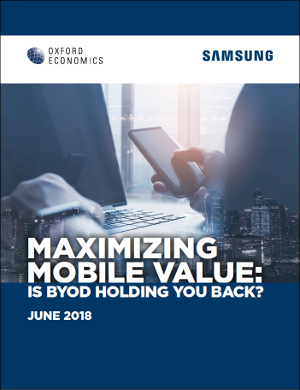Ungated Post | 13 Jun 2018
Maximizing Mobile Value: Is BYOD holding you back?

Mobile work is a strategic priority for many companies, but the fundamental decisions that enable it are too often based on short-term thinking and ad hoc policies.
To better understand the value of various approaches to device adoption, Oxford Economics worked with Samsung in early 2018 to survey 500 senior IT executives, CEOs, and other senior managers across the United States. We focused on the costs and benefits of different ways of providing mobile devices to workers, and on the goals companies have for their mobile efforts. Our research shows that up-front savings do not always maximize long-term value. Companies that depend on employees to provide their own mobile phones—an approach commonly known as Bring Your Own Device, or BYOD—do save money on acquisition costs. But over time there are other costs to consider, while factors such as increased productivity and operational efficiency can make policies that provide phones to some or all employees worth considering.
Slideshow: How Companies Go Mobile
Sign up for the Maximizing Mobile Value Webinar
Oxford Economics’ team is expert at applying advanced economic tools that provide valuable insights into today’s most pressing business, financial, and policy issues.
To find out more about our capabilities, contact:
Americas
Diantha Redd
+1 (646) 503 3052
Email
Asia Pacific
Peter Suomi
+65 6850 0110
Email
EMEA
Aoife Pearson
+44 (0)203 910 8054
Email
Related Services

Post
Global Trade Education: The role of private philanthropy
Global trade can amplify economic development and poverty alleviation. Capable leaders are required to put in place enabling conditions for trade, but currently these skills are underprovided in developing countries. For philanthropists, investing in trade leadership talent through graduate-level scholarships is an opportunity to make meaningful contributions that can multiply and sustain global economic development.
Find Out More
Post
Mapping the Plastics Value Chain: A framework to understand the socio-economic impacts of a production cap on virgin plastics
The International Council of Chemical Associations (ICCA) commissioned Oxford Economics to undertake a research program to explore the socio-economic and environmental implications of policy interventions that could be used to reduce plastic pollution, with a focus on a global production cap on primary plastic polymers.
Find Out More
Post
The Economic Contribution of Mexico’s Audiovisual Industry
This report demonstrates the integral role that the AV industry plays in Mexico's economy by estimating the industry’s domestic economic footprint. The analysis comprises all aspects of the audiovisual industry, including film production, distribution, and exhibition; the production, distribution, and broadcast of television content on free-to-air and pay TV channels; and online video platforms. Our estimates provide a recent snapshot of the audiovisual industry, including impacts at the broader industry level and broken out by sub-sector.
Find Out More